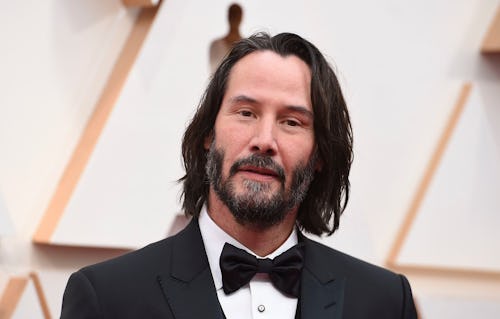
If the internet is a vengeful hellscape where you’re inevitably bound to find out something dismaying about your heroes, Keanu Reeves might be the only celebrity who will be forever spared the disappointment. A new Esquire cover story on the beloved actor, ahead of his returning role as Neo in December’s The Matrix Resurrections, is essentially centered around trying to figure out if and how Reeves is indeed the pure-hearted saint that legend has always chalked him up to be. There’s not much of an answer on the how, but, according to all the other famous people who have worked and been enamored by him, he really is that guy.
Take, for instance, Exhibit A below, an anecdote offered up by Sandra Bullock, his co-star on the blockbuster action thriller Speed. (And for the record, the two never hooked up, Bullock says.)
A year or so after Speed came out, Bullock and Keanu were hanging out, talking about whatever, and somehow the subject of Champagne and truffles came up, which is not really a subject at all, but Bullock said, offhand, that she had never had Champagne and truffles. A nothing comment. “Really?” Keanu said. “Nope, never had ’em,” Bullock said. The conversation wandered to other topics.
A few days later, Bullock was sitting in the living room of the little house she had bought—her first house—with a girlfriend. They were painting their nails. She heard an engine outside, which turned out to be Keanu’s motorcycle. He rang the doorbell, and Bullock opened the door to find him there with flowers, Champagne, and truffles. He said, “I just thought you might want to try Champagne and truffles, to see what it’s like.” He sat on the couch. Bullock poured some Champagne, and they opened the truffles. Keanu put his hands out, without a word, and Bullock painted his nails black, same as hers.
Others, from actress Marsha Plimpton to his Matrix co-star Carrie-Anne Moss offer up insights to Reeves that amount to much of the same — Plimpton explains that Reeves taught her “a sense of forgiveness. Of myself.” The profile is scattered with tidbits that a form a portrait of an improbably down-to-earth star: how he giddily went to the theaters with his friend to see his own film John Wick 3, like a kid going to see a big movie for the first time (“We got popcorn—you gotta have popcorn. Some Peanut M&M’s. Sweet and savory. Coca-Cola.” ), or what three moves of his he’d choose as a primer on his career (The Matrix trilogy; Devil’s Advocate; Point Break).
There’s also the fact that he’s disconcertingly unassuming about the intense demands of filming and training as the 57-year-old action star behind multiple billion-dollar blockbuster franchises: “I mean, ‘hard’? Come on, man. We’re making a movie!” If things do actually get hard: “So? Drink some hot tea with some lemon and honey in it. I don’t know. Slap yourself in the face.”
Reeves himself seems sheepish while talking about his ability to tap into other people on an almost spiritual level of kindness, and doesn’t seem to offer up much of an answer (“Yeah, in terms of the biological, psychological, cultural, genetic breakdown of my upbringing, I’m sure you could put together a bunch of stuff there, but that’s why I mentioned the idea of nature, because even as a kid, I was pretty empathetic.”). The closest we get to a definitive explanation in the piece is one that Reeves seems the most quiet about — one that is found in tragedy (Reeves lost an unborn child, a partner, and was close friends with the actor River Phoenix, who died of an overdose):
When we lose people in life, maybe it reminds us that life is short and all that.
He changes voices again, much quieter, and looking downward just a little bit: “Yeah, for sure.” And then: “For sure.”
“It’s a cliché, I guess,” I say.
He looks up right away and says, “No, but it’s real.”
Putting aside internet standom, which ironically tends to flatten the actual person behind the celebrity, the story prods gently at this rather universal source behind the remarkable sense of empathy that Reeves is often associated with. He’s experienced loss that has shaped his way of responding to life — that, more than anything, is perhaps what makes Reeves so relatable and so human.
“We can always do more. There’s no ceiling on that,” he said, explaining the process of being there for loved ones, and channeling it into a way of understanding and helping others. “And you can’t do everything. You can’t do it all.”







